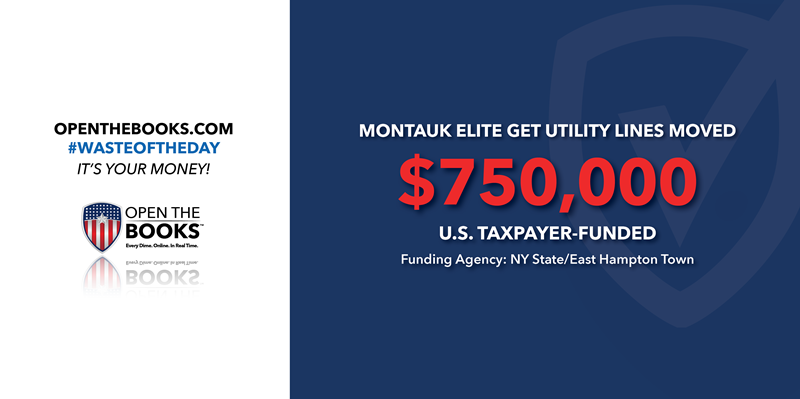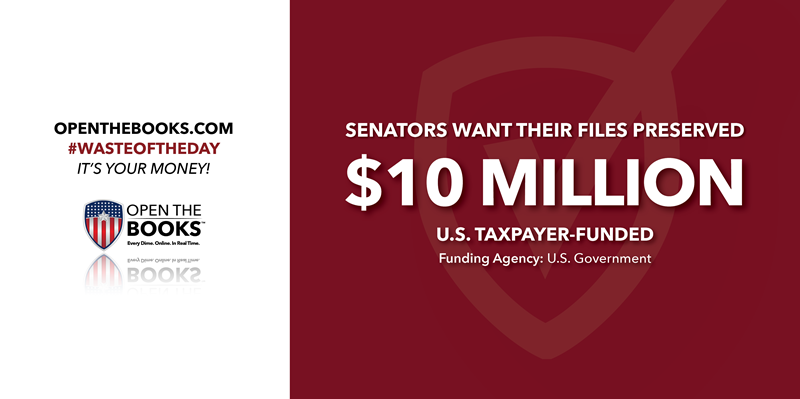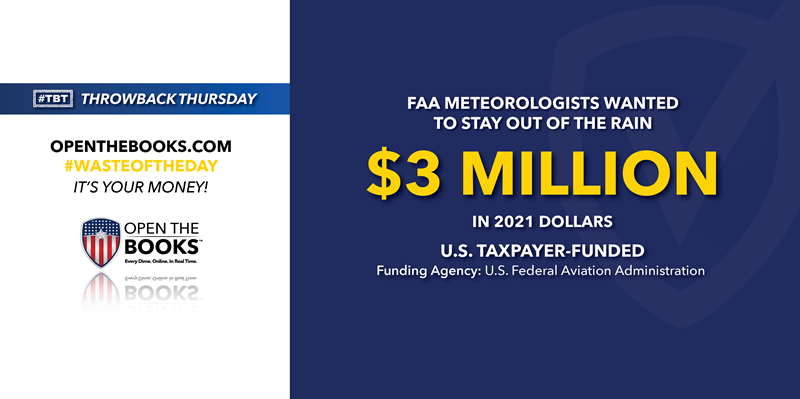
NY Taxpayers Pay $750,000 to Bury Power Lines So Wealthy Residents Can See the Ocean View
November 29, 2021

The wealthy elite who drive along scenic Montauk Highway have been so bothered by overhead power lines blocking views of the horizon across the Atlantic Ocean that they recently convinced local officials to use $750,000 in taxpayer funds to bury the lines underground.
New York State grants and money from the tony East Hampton Town will fund the plan to remove 2,240 linear feet of lines along the highway and other neighboring streets that lead to Montauk, the scenic East End of Long Island, Newsday reported.
"Placing the utility lines underground will significantly enhance the scenic vista at the gateway to Montauk," East Hampton Town Supervisor Peter Van Scoyoc said.
The main benefit of putting wires underground is improved aesthetics for the drive into Montauk, dubbed “The End” for being the end of Long Island, and whose lighthouse is a tourist attraction.
But the subterranean lines also result in fewer wind and lightning outages than overhead lines, according to PSEG, the energy company that owns the soon-to-be-relocated lines.
While regular tree trimmings aren’t required like for overhead wires, underground ones are susceptible to flooding and may take longer and be more expensive to repair, Newsday reported.
The moves comes after residents like John Keeshan have advocated for years to open the landscape at the entrance to Montauk’s downtown.
He describes a visit to Montauk as the New York version of a drive along California's Pacific Coast Highway.
Keeshan, a real estate agent, represents clients selling pricey homes, including most recently a two-bedroom, one-bathroom for $1.85 million.
The Montauk median household income was $96,389 in 2019, compared to the $72,108 state-wide median income.
Who can’t appreciate scenic ocean views while driving to one of the most exclusive areas in New York? But state and local taxpayers shouldn’t be the ones to foot the bill.
Retiring Senators Seek Funding to Preserve Their Own Files
November 30, 2021

How does spending $10 million to preserve the files of retiring U.S. senators sound?
That’s how much the Senate Appropriations Committee is seeking “to ensure a full historical record of a senator’s service.”
It’s also interesting timing that Committee Chairman Patrick Leahy (D-VT) is himself retiring next year after eight terms.
A $10 million retirement gift seems a tad bit pricey.
Leahy is the only Democrat among five other retiring senators: Sens. Roy Blunt (R-MO); Richard Burr (R-NC); Rob Portman (R-OH); Richard Shelby (R-AL); and Patrick Toomey (R-PA). Shelby and Blunt sit on the Appropriations Committee along with Leahy.
Leahy recently announced his retirement but the National Archives already has a live link next to his name for the University of Vermont’s Howe Library, where the senator’s papers will be going.
Burr also has a home designated for his Senate papers, announcing four yearsbefore he was set to retire that Wake Forest University, his alma mater, would get his records.
Wake Forest announced then that it was creating a Richard Burr Center, in partnership with the library.
Shelby also announced earlier in November that his records would go to the University of Alabama, his alma mater, and recipient of many Shelby-backed Congressional earmarks during his Senate tenure.
It’s unclear whether the House Appropriations Committee will agree to the Senate bill or if the provision will pass the Senate and get signed into law.
But it’s clear that the senators who drafted the provision think the burden of packing up their offices for retirement deserves a $10 million retirement gift from taxpayers.
With Little Oversight on $190 Billion, Schools Misspend Covid Aid
December 1, 2021

When schools across the country received billions of dollars in Covid-19 aid from the federal government, it was with little oversight, obscuring whether the funds were used to help them reopen and respond to the effects of the pandemic.
That’s according to a new report by ProPublica, which notes that since the U.S. Department of Education doled out the $190 billion, it has done limited tracking of how the money has been spent.
Some districts have spent the money “on projects seemingly at odds with the spirit of the aid program, such as track and field facilities and bleachers,” ProPublica reported.
When the first federal relief dollars started arriving in district accounts in June 2020, the Education Department’s office of inspector general warned that the department must improve its oversight, monitoring, and data collection to reduce potential fraud and waste.
The OIG noted that after the 2007-2008 financial crisis, the $98 billion that the department allocated through the American Recovery and Reinvestment Act, led to numerous investigations into abuse and waste, ProPublica reported.
The OIG raised these concerns last year to then-Deputy Education Secretary Mick Zais, who said the pandemic aid legislation created “enormous pressure” to distribute funds quickly.
A spokesperson for the OIG, Catherine Grant, said oversight and monitoring were “longstanding” issues for the department.
One of several examples of potential misuse of aid funds is in the Creston Community School District in Iowa, where $231,000 of pandemic relief funds were used to upgrade its outdoor stadium, including an expansion of its bleachers.
It’s not shocking that with little oversight, schools would use the money to fund capital projects — the Education Department should have known better than to send taxpayer funds with few strings attached.
Staying Out of the Rain, FAA Buys New Instruments to Keep Meteorologists Dry
December 2, 2021

Throwback Thursday!
Few, if any, people like to work in the rain and apparently meteorologists are no different.
It’s why in the mid-1970s the Federal Aviation Administration spent over $417,000 — more than $3 million in 2021 dollars — on 95 new meteorological instruments so that its employees could make rain predictions from the indoors.
The FAA already has instruments to perform the same function but they had to be read outdoors.
In 1976, Sen. William Proxmire, a Democrat from Wisconsin, gave the FAA a Golden Fleece award for this wasteful and nonsensical spending.
“No longer will FAA employees have to sing ‘Raindrops Keep Fallin' on My Head’ as they make their forecasts,” Proxmire said on the Senate floor in May 1976. “No longer need they fear precipitation during prognostication.”
The 95 remote readout hygro-thermometers allowed FAA personnel making weather observations about the rain without running the risk of getting caught in it.
The FAA argued that the new instruments were needed "in the interest of better observations and more efficient manpower utilization," Proxmire reported in his press release at the time.
But this response only came after he inquired about the contract to buy the equipment.
“It has at least the appearance of a ‘quickie rationale' for what is, in fact, an inexcusable luxury,” Proxmire argued then. “This expenditure by the FAA leaves the American taxpayer out in the rain while the agency's employees, safe and dry eyeball their new toy in the comfortable indoors.”
Non-Profit Hospitals Make Big Profits--While Claiming Tax-Free Status
December 3, 2021

Despite their name, non-profit hospitals build up wealth, take advantage of huge tax breaks, collect federal research grants, and pay their executives massive salaries all the while raising prices on patients.
They appear to be charities in name only, with the top 20 reporting more than $116 billion in investments in 2019.
While flush with money, they didn’t invest in basic emergency planning before the Covid-19 pandemic.
There has been criticism of these giant hospital systems that collect government aid while they hoard their own money as smaller hospitals struggle and some close their doors.
In June 2019, our auditors at OpenTheBooks published an oversight report “Top 82 U.S. Non-Profit Hospitals, Quantifying Government Payments & Financial Assets.”
We reported then that the these hospitals had combined revenues of $296.6 billion for their primary entities in FY2017, the latest year available.
A total of $297.5 million was spent on salaries for the top paid executives. Banner Health in Phoenix, Arizona had the highest paid top executive collecting $21.6 million, followed by Kaiser Foundation at $10.7 million.
A new documentary “InHospitable,” is a feature film that exposes American hospitals’ significant role in our broken healthcare system. The documentary debuted at the New York City Documentary Film Festival and calls attention to the wealth that non-profit hospitals amass. The film does an admirable job of highlighting the many ways asset-rich “non-profit” hospitals have gamed the system to earn big profits.
Furthermore, the film highlights the citizens and patients who fought the University of Pittsburgh Medical Center (UPMC). In 2019, the hospital system tried to sever ties with the insurance company Highmark. Critics alleged that the multi-billion dollar non-profit hospital’s policy decisions were increasing the price of healthcare for regular people across the region.
With $5.7 billion in cash and investments, UPMC received more federal pandemic aid than any hospital in Pennsylvania, collecting $228 million because aid was calculated based on a hospital’s revenue, not on its need.
Non-profit hospitals should start acting like charities — or else they should start paying their taxes.
The #WasteOfTheDay is presented by the forensic auditors at OpenTheBooks.com.